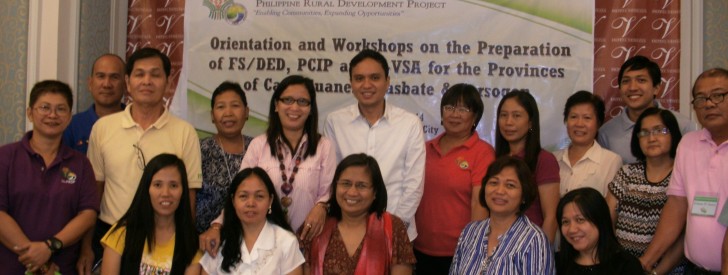
Back to back PRDP training to three more Bicol provinces held
September 5, 2014
With the end view of achieving an inclusive and market-oriented agri-fishery sector in the entire Bicol region via the Philippine Rural Development Project (PRDP), the remaining three provinces of the region, through their Provincial Program Management and Implementing Units (PPMIUs), will be capacitated. A back-to-back training on Orientation and Workshops on the Preparation of Feasibility Study (FS)/Detailed Engineering Design (DED), Provincial Commodity Investment Plan (PCIP) and Expanded-Vulnerability and Suitability Assessment (E-VSA) was conducted by the Project Support Office (PSO) Luzon B and the Department of Agriculture Regional Field Office No. 5 for the provincial local government units (PLGUs) of Catanduanes, Masbate and Sorsogon on September 2-4, 2014 at Hotel Venezia in Legazpi City.
The three Bicol provinces were joined by the PLGU team from Romblon, which is also part of the Luzon B Cluster.
Aside from equipping the participants on the preparation of technical documents, the training also aimed to enhance the skills of the project implementers on how to accomplish the expected outputs in terms of quality, timeliness and efficient fund utilization.
Economist Kathryn Louise Parungao lectured on Economic Analysis while Program Development Associate/Social Environmental Safeguards focal person Maria Iris D. Millendez oriented the participants about the SES requirements. Engr. Allan C. Tatierra, National Program Coordinating Office (NPCO) Intensified Building-Up of Infrastructure and Logistics for Development (I-BUILD) Consultant, discussed the feasibility study for farm-to-market road (FMR) sub-projects, PRDP DED requirement and standards, technical study for FMR, and program of works. Also, Mary Ann R. Cuya, planning analyst from RPCO 5, facilitated the Provincial Commodity Investment Plan (PCIP) workshop. Moreover, Engr. Arnel Tenorio, Geographic Information System Specialist (GIS) from the Geo Mapping and Governance Unit introduced them to Expanded Vulnerability and Suitability Assessment (E-VSA) and geo-tagging. After the workshops, participants were given the time to present their outputs for critiquing and revise them based on comments from the experts.
In his message, Hubilla challenged the PPMIUs to produce the best quality outputs the soonest possible time because the PRDP budget will be divided to 81 provinces on a first come, first serve basis with high regard for quality. Thus, he reminded them to make investments more inclusive for the small farmers. He said, “That is the point of this project… When you think about your enterprise, ngayon pa lang iisipin nyo na ‘Is this enterprise going to create value?” He added that the tools, especially the E-VSA will help the PLGUs to prioritize their investments well based on technical considerations.
According to Romeo S. Aquino, PPMIU head of the province of Catanduanes, the back to back training has been beneficial to his team as planners. He expressed his appreciation of the system and tools introduced to them in order to raise the bar in planning. On September 30, Aquino plans to have a consultation meeting with the processors to finalize the province’s PCIP. Known as the biggest abaca-producing province nationwide, Catanduanes’ provincial commodity is abaca.
Ramon B. Marcaida III, Provincial Planning Development Coordinator (PPDC) of the Province of Masbate, said that with the support of local executives and other PPMIU members, he is confident that the PRDP implementation in their province will be successful. Marcaida will schedule a meeting with the representatives from Philippine Coconut Authority (PCA), Department of Trade and Industry (DTI), and Department of Science and Technology (DOST) on September 9 to get their inputs for the enhanced PCIP. A stakeholders’ forum about charcoal, their provincial commodity, will be conducted on September 26.
Resource speakers Parungao, Millendez, Tenorio and Tatierra lauded the participants’ cooperation and positive response to the topics discussed. Tenorio, who lectured on E-VSA and Geo-tagging, remarked that they are receptive to the tool. Through this, they will attain the objective to provide agro-production support to the right areas. Millendez, who discussed SES requirements reiterated, “Ang mahalaga lang, same page ang province, region and PSO.”
As of press time, only the provinces of Albay, Camarines Sur and Camarines Norte have complied with the documentary requirements for the Intensified Building-Up of Infrastructure and Logistics for Development (I-BUILD). The aforementioned provinces currently have a total of P668,536,600.07 million-worth of Regional Program Advisory Board (RPAB)-approved I-BUILD sub-projects (SPs). Meanwhile, the RPAB approved a total of P77,210,125 million-fund for Investments for Rural Enterprises and Agricultural and Fisheries Productivity (I-REAP) SPs in the provinces of Sorsogon, Albay, Camarines Sur and Camarines Norte last August 20. The said SPs are now being reviewed by the NPCO for the issuance of No Objection Letter (NOL) 1 by early September this year.
On August 29, the World Bank approved the $508.25 million financing package for the PRDP, a six-year program to be implemented by the Department of Agriculture designed to provide infrastructure, facilities, technology and information in partnership with the local government units (LGUs) and private sectors that will increase incomes, competitiveness and productivity in the country’s rural areas. (Annielyn L. Baleza, I-SUPPORT InfoACE Unit, DA-RAFID 5)
